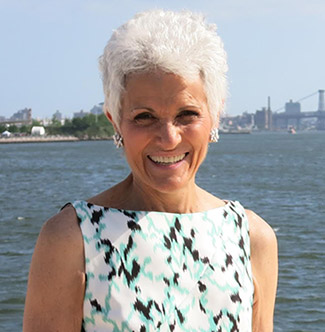
Nancy Fisher
On September 11, 2001, USC Shoah Foundation was deep into its mission to collect testimonies of Holocaust survivors all over the world. On that particular morning in New York City, survivor Miriam Tauber was scheduled to record her testimony in her daughter’s home. Then, the tragedy struck.
In the opening moments of her testimony, Tauber’s interviewer, Nancy Fisher, decided to address the crisis currently unfolding in Manhattan. She explains that the start of the interview was delayed three hours because of the uncertainty of the day, but they had now decided to attempt it.
“We don’t know who’s responsible for the attacks, but Miriam is a survivor and will inspire me to do my best to have her tell her story today,” Fisher says.
Fisher’s dedication to her job and determination to go forward with the testimony is reflected throughout her long career with USC Shoah Foundation. Tauber’s interview is just one of about 150 that Fisher has conducted for USC Shoah Foundation from its founding in 1994 to today.
Fisher insists that her tenure as an interviewer had modest beginnings. She had founded SCAN New York, a child abuse and neglect treatment program, but knew little about the Holocaust. However, when she saw an article about Steven Spielberg’s Survivors of the Shoah Visual History Foundation in 1995, she decided to volunteer in its New York office.
Fisher started out packing videotapes and would watch the tapes that were coming in, picking up interviewing techniques. Eventually, her coworkers decided it was time for her to become an interviewer herself – though Fisher wasn’t sure she had what it takes.
“[Interviewing] was more than I thought I could do,” Fisher said. “Then they assigned me to my first interview, Erika Gold. They referred to me as the ‘perennial intern’ and booted me out of the nest. But you never know who can be a good interviewer.”
Fisher attended an interviewer training in Philadelphia and studied the Holocaust, even auditing a college course, to prepare herself for interviewing Holocaust survivors. She began volunteering to conduct testimonies across the country, often doing interviews wherever she and her family happened to be traveling.
Over the years, she honed her interviewing style. Fisher said she likes paying particular attention to survivors’ lives before the Holocaust, asking them to share details about their families, traditions and lifestyles that were all but destroyed by the end of World War II.
“I learned so much from my interviewees about Judaism and sorrow and also happiness,” Fisher said. “My opening salvo was, ‘If you and I were standing in front of your childhood home, what would I see?’ It was a question that just opened up a door of returning to childhood.”
Years later, Fisher still remembers interviews vividly. There was Olga Yengyel, the author of the book Five Chimneys, which Fisher had happened to read when she was first learning about the Holocaust. There were interviews with unexpected interruptions and background noises. The September 11 interview was unique, Fisher said, because it was the only time she and a survivor experienced a devastating event together.
Fisher has kept in touch with many of her interviewees and considers them friends. She also developed close bonds with many of the videographers she was teamed with and is still grateful for their dedication and professionalism.
Even today, she continues to make connections because of her time with USC Shoah Foundation. She recently helped the French Holocaust researcher Serge Klarsfeld translate additions to his book Children of the Holocaust – an introduction that came about because of Fisher’s attempts to research the family of survivor Suzanne Cohn, who Fisher interviewed in 2011. Fisher worked closely with another former interviewee, Arlette Baker, on the project.
As its mission has evolved over the past 22 years, USC Shoah Foundation no longer employs a cadre of interviewers around the world to conduct Holocaust testimonies, though the Institute still asks Fisher to do one-off interviews with special funding every so often.
When asked how she feels about the impact she has made on those who will learn from the testimonies she conducted for generations to come, Fisher says that her motivation has always been focused on the survivors themselves.
“In today’s world in the context of what’s happening with the refugee crisis in Europe, what does it really mean to be uprooted and have to start again? It’s no longer something that happened in ‘30s and ‘40s, it’s happening today,” Fisher said. “But for the horror that came in [the survivors’] childhoods, everybody came from someplace and there are things that are so important to remember about where we came from.”